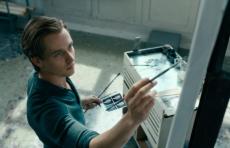「芸術的な人生観とは、それでもなぜそこにまだ価値があるのか理解しようとすること」『ある画家の数奇な運命』 フロリアン・ヘンケル・フォン・ドナースマルク監督 インタビュー/ Interview with Director Florian Henckel von Donnersmarck about “Never Look Away”
NeoL / 2020年10月1日 17時0分
「芸術的な人生観とは、それでもなぜそこにまだ価値があるのか理解しようとすること」『ある画家の数奇な運命』 フロリアン・ヘンケル・フォン・ドナースマルク監督 インタビュー/ Interview with Director Florian Henckel von Donnersmarck about “Never Look Away”
現代美術界の巨匠ゲルハルト・リヒターの半生をモチーフに描いた新作映画『ある画家の数奇な運命』が10月2日より全国公開される。舞台はナチ政権下のドイツ。幼い少年クルトは叔母の影響で芸術に親しみを感じる日々を送っていた。だが、精神のバランスを崩した叔母は、強制入院の果てにナチスの安楽死政策によって命を奪われてしまう。終戦後、東ドイツの美術学校に進学したクルトは、エリーという名の女性と恋に落ち、元ナチ高官の彼女の父親が叔母を死へと追いやった張本人だと気づかぬまま結婚する。やがて、東ドイツのアート界に疑問を抱いた彼は、エリーと共に西ドイツへ逃亡。叔母の遺した「真実はすべて美しい」という言葉を胸に、真実を求めて創作活動に没頭していくー。
実に3時間を超える大作を手がけたのは、長編映画監督デビュー作『善き人のためのソナタ』でアカデミー賞®外国語映画賞を受賞したドイツ出身のフロリアン・ヘンケル・フォン・ドナースマルク監督。リヒターから1ヶ月にわたる取材を許可され、人物の名前を変えて、どこまでが真実かは明かさないことを条件に映画化を実現した。信念にひたすら向き合うことで、内なる苦悩や葛藤を光へと昇華していく若き芸術家の物語について、ロサンゼルス在住の監督にリモートでインタビューを行った。(→ in English)
――『ある画家の数奇な運命』はとても美しくて壮大な作品ですね。監督はなぜこの物語を伝えたいと思ったのですか?
フロリアン・ヘンケル・フォン・ドナースマルク監督「私は長年にわたって、一人の人間が苦しみを乗り越え、その苦しみから芸術を生み出す様を描いた物語を模索していました。当初はオペラの作曲家を主人公にして、彼が自分の人生に起きた悲惨な出来事を芸術に昇華するまでを描きたいと思っていたんです。貧しくて、病を患い、愛する女性から愛してもらえない男が、気の滅入るような小さいアパートで、そういったすべての出来事を美しいアリアに注ぎ込む。そして映画の最後には、彼の人生が美しい形態を通して大舞台で披露されるのです。面白い映画的実験になるのではないかと思ったのですが、十分に感動的で私的な物語を見つけることができませんでした」
――ゲルハルト・リヒターの物語には、どのようにして出会ったのですか? 伝記映画ではないとはいえ、本作を制作する上で彼の人生のどういった部分に最も刺激を受けましたか?
フロリアン・ヘンケル・フォン・ドナースマルク監督「きっかけとなったのは、私をインタビューしてくれたジャーナリストでした。彼からリヒターの伝記を書き終えたところだと言われたのです。私は彼に、『リヒターについてはすでに多くの本が出されているのに、なぜ書こうと思ったのですか? 新しい視点はどのようなものですか?』と聞きました。すると彼は、『幼いリヒターを抱いた彼の叔母を描いた絵があるのですが、彼女はナチスに殺害されたのです』と。私は『もちろん知っています』と答えました。ドイツでは有名な話ですから。そのジャーナリストいわく、調べていくうちに、リヒターの結婚相手の父親が、ドレスデンで実施された(彼の叔母を死へ追い込んだ)安楽死プログラムの責任者だったことが判明したというのです。それは興味深いと思いました。被害者と犯罪者が家族として一つ屋根の下に暮らしていたわけですから、作曲家を画家に変えればいいだけで、物語の出発点として面白いと思ったのです。そこからどのような物語にするべきか考え、前述のジャーナリストの著書も読みました。とても良い本で詳しく調査してあったのですが、私が望んでいたようなエキサイティングな要素は含まれていませんでした。でも私はドキュメンタリー監督ではないので伝記映画にする必要はなかったですし、リヒターの人生の一つの要素をインスピレーションにして、自分が構想していた作曲家の物語を紡げばいいだろうと考え、本作の脚本を書きました。それがすべての始まりです」


――本作を制作するにあたって、実際にゲルハルト・リヒターにお会いしたそうですね。彼のように壮絶な人生を送ってきた人にとって、過去について話すのはつらいのではないかと思われますが、監督に対しては心を開いてくださったのですか?
フロリアン・ヘンケル・フォン・ドナースマルク監督「私はちょうど良いタイミングに彼と会えたのだと思います。当時の彼は画家として少し行き詰まっていたようなのですが、私に対して自分の人生について語った後、壁を乗り越えられたようです。私たちはある意味でお互いを利用し合っていたのでしょう(笑)。(彼にとって)私は無料の分析医で、私にとって彼は無料のインタビュー対象者であり、リサーチャーだったわけですから。私たちは彼の人生についてくまなく語り合い、一緒に数日間ドレスデン(リヒターの故郷)にも行きました。彼がそれまで一度も帰ったことのなかった生家や、妻や元ナチ高官の医師(義理の父)と共に住んでいた家を訪れたのです。また、彼が初期の作品を描いた当時のスタジオにも足を運びました。その後、私は彼の住むケルンに戻る前にミュンヘンに行ったのですが、私がミュンヘンに滞在していた3日間ほどで、彼は非常に素晴らしい絵を20点も描き上げていました。順序立てて人生を振り返ったことで、画家としての壁を乗り越えたようです。ですから、彼に会ったタイミングが良かったのだと思います」
――映画を観て、芸術には世界を変えることはできないかもしれないけれど、人々を癒すことはできるという考え方に共感しました。リヒターから聞いた話で特に印象に残っていることはありますか?
フロリアン・ヘンケル・フォン・ドナースマルク監督「私が感心したことは、リヒターは人としてはたくさんの複雑な側面を持っている反面、アーティストとしては信じられないくらい正直で、常に真実を追っているということです。彼のそういった部分は主人公のクルトにも反映したつもりです。たとえ自分の人生について嘘をついていようが、ひどい夫であろうが、何であったって、自分のアートにおいて正直であるならば、素晴らしいアーティストだと言えるのです」
――劇中のクルトの叔母は幼い彼に対して、「決して目をそらさないで。真実はすべて美しいのだから」と伝えます。クルトはその言葉を胸にその後の人生を生きていくわけですが、監督が人生で大切にしている言葉やアドバイスはありますか?
フロリアン・ヘンケル・フォン・ドナースマルク監督「アートについて知っていることはすべて映画に詰め込んだつもりなので、それ以上のことはわかりません(笑)。クルトの叔母による『真実はすべて美しい』という発言は大胆なものです。だって、それって一体どういう意味なのでしょうか? 戦争が生み出した、言葉にするのもはばかれるような悲劇や残虐行為でさえも美しいというのでしょうか? ある意味で私が試みたのは、この映画におけるすべての出来事をできるだけ美しく、人間らしく演出することでした。私はいまだかつてないほどに美しい映画を作る気でいたのです。クルトの叔母によるこの主張を徹底的に検証するために、劇中で史上最悪な残虐行為を映し出すことは、私の野心のようなものでした。それは本当に真実なのでしょうか? おそらく違うでしょう。でも、私はできる限り拡大解釈したかったのです」
――なるほど。
フロリアン・ヘンケル・フォン・ドナースマルク監督「アートでも、ストーリーテリングでも、どんなことにおいても、人生を暗い目で見つめるのでは簡単過ぎるということを忘れないようにしています。もしそれしかできないのであれば、アーティストとは呼べないのではないでしょうか。あなたがおっしゃったように、私もある種の癒しや慰めや問題を解決する方法をアートに求めています。人生を絶望的で暗いものとして捉え、『どうせ最終的には死ぬんだし、自分が先に死なない限り、愛する人たちだって目の前で死んでいくんだ』と言うのは簡単です。それは人生の暗い捉え方であり、真実なのかもしれませんが、あまり芸術的な人生観とは言えません。芸術的な人生観とは、それでもなぜそこにまだ価値があるのか理解しようとすることだと思います」


――劇中のクルトは常に真実を探しています。それは彼にとっての真実ではありますが、彼の目を通して、現代を生きる私たちも多くを学べると感じました。2020年は誰も予想していなかったような年になってしまいましたが、監督にとって、今のこの世界における真実とは何ですか?
フロリアン・ヘンケル・フォン・ドナースマルク監督「真実を自分自身の中に見出すのは、それぞれの個人の責任です。私が最も軽蔑するのは集団思考と体制順応主義です。なぜなら、それはある意味で個人としての自分を諦めていることになるからです。私は個人を強く信じています。非常に基本的なレベルでは、もしそこにたどり着くことができれば、私たちはお互いの間に驚くべき共通点や類似点を見出せるかもしれません。でも、今回の危機から得た有益なものがあるとしたら、それは人々が社会生活に邪魔されない日々を送らざるを得なかったということでしょう。それにより、私たちはこれまでよりも少し自分の内面を見つめることを余儀なくされました。そういう意味では、私はこの映画がCOVID-19時代にさらなる今日性を持つのではないかと願っています。初めて自分の内面を見つめ、何とか自分自身と外の世界の真実を見つけることができた、一人の人間について描いた作品だからです」
――コロナ禍において、私たちはクリエイティブな面でも新たな制限を課せられています。映画監督/クリエイターとして、COVID-19後の創作活動についてはどうお考えですか?
フロリアン・ヘンケル・フォン・ドナースマルク監督「アメリカでは実現していませんが、海外では業界が再び動き出しています。今後も素晴らしい劇場体験を期待できるでしょうか? もちろん、それは疑問です。でも、劇場はいずれにしても死にかけていました。とはいえ、明確なビジョンを持った監督が演出する役者を駆使したストーリーテリングは、かつてないほどに精彩を放っています。これまでとは別の手段を取るかもしれませんが、世界で起きている変化を理解するために、人々はこれまで以上に物語を必要としているのです」


――監督にとって、この映画を製作したことで得た最も大きなものは何ですか?
フロリアン・ヘンケル・フォン・ドナースマルク監督「白髪です(笑)。本作を作るのは非常に難しかったので。あらゆる小さなことに至るまで信じられないほど大変だったので、今後は2度とこのような苦労はしたくありません。ナチ政権が企画した退廃芸術展を再現するためには、作品の多くが後にナチスによって処分されてしまったため、大勢のアーティストを雇って偽造する必要がありました。ドイツの混乱をリアルに感じられるように見せることも難しかったです。私たちはまた、両親や祖父母の世代の物語を伝える上で責任を感じていました。本作に関わった私たちの誰もが、彼らの苦しみを正当に表現しなければと多大な責任を感じていたと思います。それと同時に、本作にはこれまでに経験したことがないほど大きな反響がありました。しかし、お察しの通り、これまでにないほどの攻撃も受けました」
――今後の予定は?
フロリアン・ヘンケル・フォン・ドナースマルク監督「いくつかの作品が控えています。一つは、メイン州出身の若手の作家による『Everything Matters』という素晴らしい小説の映画化権を獲得しました。事情があって、いつ世界が終わるのかを知っている少年についての物語です。誰も信じてくれないような知識と共に、彼がどうやって人生を生きていくかが描かれています。本当に素晴らしくて興味深い本ですし、面白い映画に仕上げるためのアイデアも浮かんでいます。まだ脚本は書いていないのですが、すでに着手しているので、それが次回作になるかもしれません」
text Nao Machida
『ある画家の数奇な運命』
10/2(金)TOHOシネマズ シャンテほか全国ロードショー
https://www.neverlookaway-movie.jp
<STORY>ナチ政権下のドイツ。少年クルトは叔母の影響から、芸術に親しむ日々を送っていた。ところが、精神のバランスを崩した叔母は強制入院の果て、安楽死政策によって命を奪われる。終戦後、クルトは東ドイツの美術学校に進学し、そこで出会ったエリーと恋に落ちる。元ナチ高官の彼女の父親こそが叔母を死へと追い込んだ張本人なのだが、誰もその残酷な運命に気付かぬまま二人は結婚する。やがて、東のアート界に疑問を抱いたクルトは、ベルリンの壁が築かれる直前に、エリーと西ドイツへと逃亡し、創作に没頭する。美術学校の教授から作品を全否定され、もがき苦しみながらも、魂に刻む叔母の言葉「真実はすべて美しい」を信じ続けるクルトだったが―。
監督・脚本・製作:フロリアン・ヘンケル・フォン・ドナースマルク(『善き人のためのソナタ』)
撮影: キャレブ・デシャネル/音楽: マックス・リヒター 原題:WERK OHNE AUTOR/
英題:NEVER LOOK AWAY/2018年/ドイツ/ドイツ語/189分/カラー/
アメリカンビスタ/5.1ch/日本語字幕:吉川美奈子/配給:キノフィルムズ・木下グループ/R-15
(C)2018 PERGAMON FILM GMBH & CO. KG / WIEDEMANN & BERG FILM GMBH & CO. KG

――“Never Look Away” is such a beautiful and epic film. Why did you want to tell this particular story?
Florian Henckel von Donnersmarck: I've been looking for many years to find a story about how a person overcomes suffering and used that suffering to create art. Originally, I wanted to make it about an opera composer who turns all the terrible things that happened in his life into art. He's poor and sick and the woman he loves doesn't love him that he goes into his depressing little apartment and turns it all into beautiful arias. We find his life on the big stage at the end of the movie in this beautiful form. I thought that would be an interesting cinematic experiment, but I didn't find any opera story that really was compelling enough or personal enough to tell.
――I understand that it’s not a biopic, but how did you come across Gerhard Richter’s story? What about his life that you were most inspired by?
Florian Henckel von Donnersmarck: Through a journalist with whom I had an interview actually, he told me that he'd just written a biography of Richter. I said, "Why would you do that? So much has been written about Richter. What's the new angle?" and he said, "Well, there is this painting he did of his aunt holding him as a little baby, and she was murdered by the Nazis." I said, "Yeah, I know that." It's a well-known story in Germany. He said what he found out through his research was that the father of the girl Richter ended up marrying was the guy responsible for the euthanasia program in Dresden. And I thought, OK, that's interesting. That's an interesting starting point for a story, because you have the victims and the criminals living together under one roof in one family. I thought that could be an interesting way maybe to tell my story of the opera composer, only now with a painter. Then I invented a whole story about what this could be like and read the book from this journalist. It was a very good book, well-researched, but it didn't have all the exciting things that I hoped would be in it. So I said, "Well, luckily I'm not a documentary filmmaker and I don't have to make this a biography. I'd just be inspired by one thing from his life to tell my story of the opera composer,” and then wrote this script. That's how it all happened.


――I heard that you actually consulted with Gerhard Richter for this film. For someone like Richter who has gone through a lot in his life, I imagine that it may not be easy to talk about his past. How open was he when you talked to him?
Florian Henckel von Donnersmarck: I think I just caught him at the right moment. He was in a little bit of a painter's block which then resolved after he talked through all these things. I think in a way, he was probably using me as much as I was using him [laughs.] Because I was a free analyst and he was a free interview subject and researcher to me. So we went through his whole life and went to Dresden together for a few days. We visited his childhood home where he hadn't been since then, where he lived with his wife in the house of the Nazi doctor. Then we went to where his old studio was, where he did his first paintings. We went to all those places and after that, I had to go to Munich for a few days before I returned to Cologne where he lives. While I was in Munich, in maybe three days, he had painted 20 really, really good paintings, because he’d overcome his painter's block by thinking through his life in a structured way. So I think I was just lucky that I got him at the right moment.
――I like how the movie talks about that art can't change the world, but it can comfort you. What were some of the things that he told you that gave you inspirations?
Florian Henckel von Donnersmarck: What I find just impressive about him is that for all the complicated sides that he may have as a human being, as an artist, he is incredibly honest and always in search of the truth. That's something that I tried to bring into this character. It doesn't matter, you can lie about your life, you can be a terrible husband, you can be anything, but if you are honest in your art, you are still a great artist, you know?


――In the movie, Kurt's aunt tells him, "Never look away, everything true is beautiful," and he keeps that advice close to his heart for the rest of his life. Do you have any words or advice that you keep close to your heart?
Florian Henckel von Donnersmarck: I tried to put everything that I know about art into the movie, so I don't know much more than that [laughs.] "Everything true is beautiful" is a daring statement the aunt makes. Because what does that mean? Does that mean that some unspeakable tragedy and atrocities of a war are beautiful? In a way, what I did is I tried to stage everything in this film as beautifully and as humanly possible. I tried to make the most beautiful film ever made. That was kind of my ambition while showing the worst atrocities that were ever committed, in a way, to put this thesis of the aunt to an extreme test. Is that really true? Probably not, but I want to stretch it as far as you could.
――I see.
Florian Henckel von Donnersmarck: The one thing that I kind of remind myself of in art, in storytelling and in anything is that it's too easy to look at life in a dark way. I think if that's all you can do, I don't think that you are really called to be an artist. Because as you were saying, I go to art for some kind of comfort, for some kind of consolation about problems, and for ways to solve problems. It's easy to look at life as something depressing and dark and just say, "Look, we will die by the end of our lives and all of the people that we love, we will see them die if we don't die first." That's a bleak way of looking at life. It may be true, but I think it's not a very artistic way of looking at life. I think an artistic way of looking at life is trying to see why it is still worthwhile.
――In the film, Kurt is always searching for the truth. It is his personal truth that he's searching for, yet there is so much we could learn today through his eyes. 2020 has been a crazy year that none of us had imagined maybe a year ago, but what is the truth for you in this world today?
Florian Henckel von Donnersmarck: It has to be up to every individual to find that truth within herself or himself. The thing I despise the most is group think and conformism because it's in a way giving up on yourself as an individual. I so much believe in the individual. I do think that on the very fundamental level, if we manage to go there, we find there are incredible commonalities and incredible similarities between people. But if there has been an advantage to this crisis, it's that people have been forced to live without many of the distractions, certainly of the distractions of social life. They have been forced to look a little bit more within. So in some way, I hope that this film could be even more relevant now in COVID times because it shows how one person, by looking within for the first time, manages to really find himself and the truth of the outside world.
――We got these new creative restrictions amid the pandemic as well. As a filmmaker/creator, what do you think about your creation post-COVID?
Florian Henckel von Donnersmarck: I can see the industry opening up again even if it's not happening in the U.S. It's happening elsewhere. Will it still be a great theatrical experience? That of course is a question. But you know, theater was dying anyway. But scripted storytelling with actors directed by directors with a vision of what they want, that is more alive than ever before. It might take different avenues, but I think people need stories more than ever before to make sense of all the changes that are happening in the world.


――What was the biggest thing you got through making this film?
Florian Henckel von Donnersmarck: I got white hair [laughs.] It was an unbelievably difficult film to make, I hope it will never again be this hard because every little thing was an unbelievable challenge. From recreating the Degenerate art exhibit that the Nazis had where we had to employ entire armies of art forgers and artists to create these pictures, many of which were destroyed after the Nazis show these pictures, right through to just showing the distraction of Germany and making it feel real. We also felt the real responsibility towards the generation of our parents and grandparents whose lives we are telling in a way. I think all of us who worked on this film felt an incredible responsibility to do justice to their sufferings. At the same time, we got incredible reactions more than I've ever had for a movie, but we also got attacked more than ever as imaginable.
――What's next for you?
Florian Henckel von Donnersmarck: I have few projects. I bought the right to this wonderful novel by a young novelist from Maine called "Everything Matters." It's a story of a boy who for reasons knows exactly when the world is going to come to an end. It's about how he lives with this knowledge that he knows no one would ever believe him, but he knows it and it's about how he lives his life. It's a really wonderful and interesting book and I have an idea on how to turn that into what I think would be an interesting film. So that might be the next one, but we'll see. I haven't actually written it down yet. I've started and maybe that will be the next one.
text Nao Machida
関連記事のまとめはこちら
https://www.neol.jp/movie-2/
外部リンク
- 「芸術的な人生観とは、それでもなぜそこにまだ価値があるのか理解しようとすること」『ある画家の数奇な運命』 フロリアン・ヘンケル・フォン・ドナースマルク監督 インタビュー/ Interview with Director Florian Henckel von Donnersmarck about “Never Look Away”
- 自分のペルソナと向き合うーー『Break the Silence: The Movie』
- 「人はよく“自分が知っているものを作るべきだ”と言いますよね。私はその言葉に従って、自分がとても大切に思っていることについて書きました」『フェアウェル』 ルル・ワン監督インタビュー/ Interview with Lulu Wang about “The Farewell”
- 『鵞鳥湖の夜』グイ・ルンメイ インタビュー「将来に対して大きな夢を見ることが叶わない貧困層の若い女性であるアイアイにとって、別の人生に繋がる可能性がある賭けをするか否かという物語なのです」/Interview with Gwei Lun-Mei about “The Wild Goose Lake”
- 結末のない映画特集:「女性の働き方や人生の選択の仕方はこれからたくさん増えていくし、正解は一つじゃない」三吉彩花 & 阿部純子 & 津田肇監督 『Daughters』インタビュー
この記事に関連するニュース
-
アグレコジャパン、加藤慎章氏が代表取締役社長および韓国・台湾を含む地域統括代表に就任
PR TIMES / 2025年1月23日 21時40分
-
「私たちを人間として扱ってほしい」やまぬ爆撃、家族との別れ…ガザ脱出の友人を探し記者がエジプトへ「戻りたいけど誰も戻れない」【脱出者が語る惨状】
北海道放送 / 2025年1月18日 9時45分
-
「そっくりじゃんって思ったら本人」 小峠英二、英アパレルブランドXにまさかの「レジェンド」として登場
J-CASTニュース / 2025年1月15日 15時40分
-
旅行者はGoogleを活用し続けつつ、AI生成のソーシャルメディアコンテンツにも肯定的
PR TIMES / 2025年1月14日 10時45分
-
この英語ってどんな意味?「 plot twist 」
OTONA SALONE / 2025年1月11日 7時0分
トピックスRSS
ランキング
-
1「昔は銃メーカーでした」 ルーツが意外すぎる世界のビックリ自動車企業 トホホな転身の理由も
乗りものニュース / 2025年1月22日 9時42分
-
2所要時間わずか「3分の1」に!? 練馬の「平和台トンネル」開通効果がスゴかった 環八の“地獄渋滞”交差点を丸ごとスルー!?
くるまのニュース / 2025年1月24日 7時30分
-
3スズキ「ソリオ」3気筒エンジン化は吉と出るか フェイスデザインやパワートレインを大幅変更
東洋経済オンライン / 2025年1月24日 12時0分
-
4モヤモヤする「フジテレビのガバナンス問題」 中居正広さんは芸能界引退発表、関係者も言及
東洋経済オンライン / 2025年1月24日 8時20分
-
5トランプ政権もう不協和音?イーロン・マスク氏「ソフトバンクはカネがない」と78兆円AI投資に疑義の本音
日刊ゲンダイDIGITAL / 2025年1月24日 11時14分
記事ミッション中・・・
記事にリアクションする
![]()











